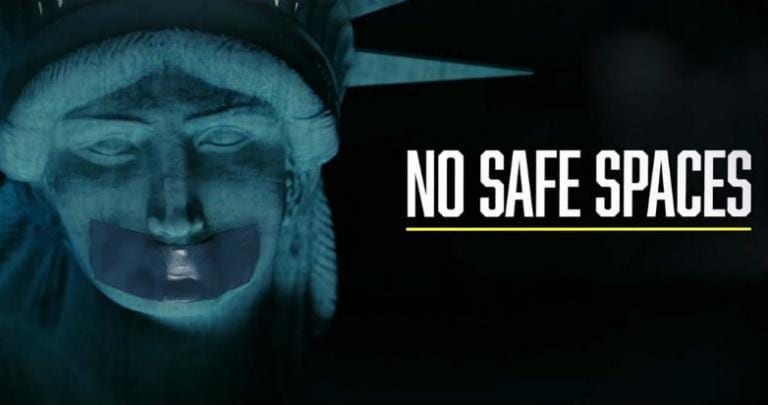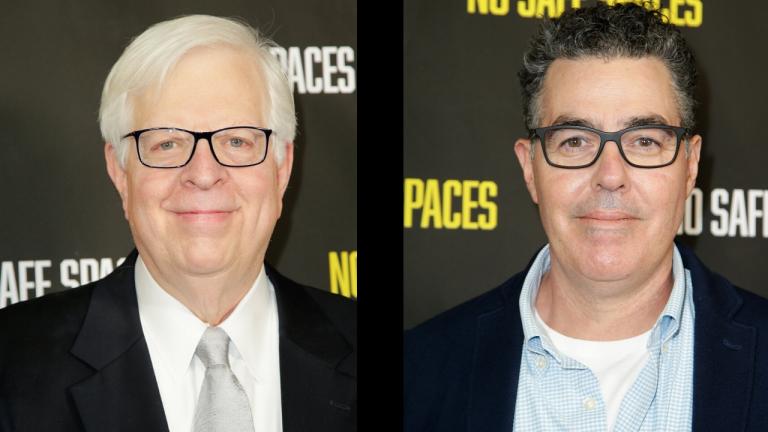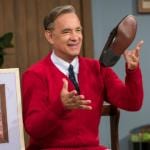
Currently playing in selected theaters across America (with more to come), the documentary No Safe Spaces, starring the unlikely duo of comedian and podcaster Adam Carolla and erudite radio host Dennis Prager, makes a case against the suppression of free speech, in particular on college campuses.
In today’s social-media “cancel culture” and especially on campus, plenty of folks have found their freedom of speech, and even assembly, challenged, curtailed or entirely abridged. Carolla, a freewheeling nonbeliever, and Prager, an observant Jew, make the argument that much of this animus is directed at political and social conservatives, and traditional Christians.
(UPDATE 11/21: It’s an argument that found favor with the Variety reviewer, who’s apparently not a fan of a lot of the people in the movie but is a fan of free speech.)

But, as the documentary shows, by highlighting a series of protests at “progressive” Evergreen College in Washington State, even political liberals, like former Evergreen evolutionary-biology professor Bret Weinstein, can find themselves the targets of activists if they don’t accede to all the protesters’ demands.
Some reviewers have claimed that the documentary is one-sided. Perhaps it is, but as anyone who’s followed the campus free-speech conflicts could attest, the protests are largely directed at anyone considered conservative, libertarian or insufficiently “progressive.” Those professing Left-leaning viewpoints, even radical far-Left ones, are seldom the recipients of this treatment.
The feature-length No Safe Spaces alternates among interviews with Carolla and Prager, and scenes from their No Safe Spaces tour. Other interviews include Ben Shapiro, Tim Allen, Alan Dershowitz, Sharyl Attkisson, Van Jones, Dave Rubin, Candace Owens, Cornel West, Ann Coulter and Jordan Peterson, along with some not-so-famous people who’ve experienced problems on campus. There are also news clips, some scripted sequences and animation, such as the cartoon Carolla and Prager witnessing the violent demise of the First Amendment (a la Schoolhouse Rock).
The day of the Los Angeles premiere on Monday, Nov. 11, I sat down with Prager — also an author of Biblical commentaries and founder of the YouTube series Prager U — to talk about free speech and how the political Left (and Prager makes a distinction between liberals and Leftists) is in no mood to tolerate other viewpoints.
I mentioned that some Leftists claim that, in the past, conservatives and orthodox Christians suppressed their viewpoints, so they believe turnabout is fair play. To this, Prager responded:
First of all, if any of them say it, they’re not terribly bright, which I would say is true for most people on the Left. It’s not meant to insult them. You cannot think clearly and be a Leftist. You can think clearly and be a liberal. You can think clearly and be a conservative. You can think unclearly and be a liberal. You can think unclearly and be a conservative. But you cannot think clearly and be a Leftist.
So, if they say that, you realize what they’re saying? “We are acting like the medieval Church,” and they’re right. They’re entirely right. The university is the medieval Church at its worst. The medieval Church had some positive aspects. There were many positives, but there were many negatives. It was suppressive.
I would say, a scientist had more freedom in 17th-Century Europe than a conservative on campus does today. I never exaggerate, because I took a vow not to, when I started radio 37 years ago. You don’t get a good reputation over time. I kid around a lot, but I never exaggerate.
The suppression of conservatives in America today is so great that people are afraid to acknowledge who that they are. They’ll be kicked or spat at or yelled at or fired or shunned, and they know it.
Here’s what he had to say on why Leftists are so adamant about having their way at the expense of other viewpoints:
Every Leftist is a Leftist before anything else. They are Leftists before they’re an artist. They’re a Leftist before they’re a Christian. They’re a Leftist before they’re a Jew. They’re a Leftist before they’re a baseball player. They’re a Leftist before anything they do. Leftism is their religion. That’s it. It’s a religion.
We know what they stand for, but we don’t understand it. I’ve spent my life, and it’s not easy, by the way, because it’s incoherent.
People don’t understand that it’s a secular religion. We know what they stand for. We know everything they say. We study under them; we read them; we hear them; we watch them. They don’t read us, hear us or watch us. They don’t.
That’s why I win the debates with them. Not because I’m a good debater — I am, but that’s not the reason I win. I won because they don’t know any of my arguments, and I know all of theirs. That’s true.
Because, they believe that if you have a non-Left belief, it’s nonsense. So, therefore, it’s not worthy of their time.
But, while much of this suppression goes against the grain of the American ethos, which has traditionally had free speech ingrained as a deeply held value, it’s not all strictly illegal.
The First Amendment reads:
Congress shall make no law respecting an establishment of religion, or prohibiting the free exercise thereof; or abridging the freedom of speech, or of the press; or the right of the people peaceably to assemble, and to petition the Government for a redress of grievances.
Note that the amendment refers to the government restricting your speech, not private enterprise or your fellow citizen. For example, your employer can restrict your speech as a condition of employment. A news outlet is free to publish what it likes (within the bounds of libel laws, copyright, etc.), but is also free not to publish what it doesn’t. Citizens, then, are free not to work for employers that place restrictions on them, or not to patronize certain news outlets.
In educational terms, a private school of any sort, even a private college or university, is not legally required to allow you to exercise your free speech on its property. Also, a private educational institution with a publicly stated philosophical or religious point of view is free to prioritize that viewpoint over unrestricted freedom of expression. Students who disagree with this are free to attend a different school.
Concerning jobs and private schools, these restrictions on speech can prove a hardship to some, even a severe one, but that doesn’t mean these folks necessarily have the First Amendment on their side — but they may have market forces and the power of public opinion. Just because something isn’t illegal doesn’t mean it can’t be opposed.
However, institutions that trumpet themselves as bastions of free expression, inquiry and debate, and promise a comprehensive education (in exchange for much moola), should live up to their own billing. This is especially true of taxpayer-supported public colleges and universities, who are under legal constraints.
As the ACLU states:
The First Amendment to the Constitution protects speech no matter how offensive its content. Restrictions on speech by public colleges and universities amount to government censorship, in violation of the Constitution. Such restrictions deprive students of their right to invite speech they wish to hear, debate speech with which they disagree, and protest speech they find bigoted or offensive. An open society depends on liberal education, and the whole enterprise of liberal education is founded on the principle of free speech.
How much we value the right of free speech is put to its severest test when the speaker is someone we disagree with most. Speech that deeply offends our morality or is hostile to our way of life warrants the same constitutional protection as other speech because the right of free speech is indivisible: When we grant the government the power to suppress controversial ideas, we are all subject to censorship by the state.
Some wish to suppress certain speech that they consider “hate speech,” fearing it will upset or endanger people (hence the “safe spaces” in title). It’s clear that we’re not allowed to, for example, yell “Fire!” in a crowded theater (unless there’s a fire, of course) or directly tell someone to commit a crime. It’s an irony that free speech is most needed to protect things that people might disagree with or find offensive, since speech that makes everyone smile is never in need of a defense.
So who decides what qualifies as “hate speech”? Prager said:
Half the Millennials believe that there should be no free speech for hate speech. … Who determines what’s hate speech? Everybody thinks what they don’t agree with is hate speech. I think Left speech is hate speech. I don’t think it; I know it. But I still want them to be free to say it … they don’t think that way.
They are gods. They have eaten from the Tree of Knowledge of Good and Evil and have become like gods. That’s why [the story in Genesis] is great. That’s why I wrote the Bible commentary, because, if you understand the Bible, you understand what’s going on.
Asked what he says to people who dispute this, Prager replied:
If we were in the majority, and we thought socialism was hate speech, or that denying there was gender was hate speech, would you be OK if we suppressed yours? What you’re saying is, the majority can suppress the minority. That’s all it means. When you say hate speech can be bad. That’s what you’re saying. I get through to college kids when I speak.
It’s unlikely that very many people who don’t agree with Carolla and Prager will go see No Safe Spaces, but Prager is fine with that:
First of all, it’s critical to speak to the choir. The choir doesn’t even know. I’ve always said this, my whole life — and, believe me, with Prager U‘s billion views, we speak to a lot of people not in the choir — but it doesn’t matter to me. It matters, but it doesn’t matter that much, because the choir forgot the melody.
Many political conservatives or holders of traditional religious views on “progressive” campuses or in left-leaning metropolises like New York City, San Francisco or Los Angeles, or in other liberal enclaves and college towns, often don’t share certain opinions and beliefs with whose with whom they disagree — because they fear being bullied or ostracized or worse. Obviously, in more conservative places, the reverse could be true (but these places are usually not hubs of influential media).
That’s a rough situation for those people, but it also means that the others not hearing their views have a distorted and inaccurate idea of the world around them. They may sincerely spend their days thinking everyone they know agrees with them, because they don’t hear a dissenting opinion.
Every now and then, though, they may discover they’re wrong — and it can come as an awful shock.
No Safe Spaces is rated PG-13 for some violent images. Click here to find out where the film is playing.
Images: Atlas Distribution; Maury Phillips
Don’t miss a thing: Subscribe to all that I write at Authory.com/KateOHare














